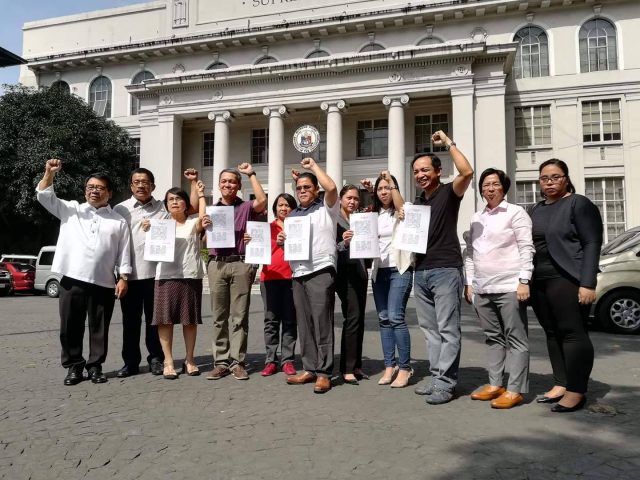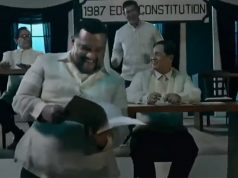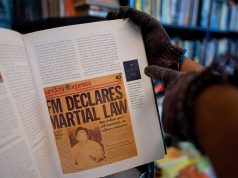
MANILA, Philippines — Activists, including lawmakers, human rights lawyers and lumad and peasant leaders, petitioned the Supreme Court on Monday, January 8, for a temporary restraining order and an “inclusive and thorough judicial query” into the yearlong extension of martial law in Mindanao.
The petition, filed with the assistance of the National Union of Peoples’ Lawyers, claimed the extension of martial law “is actually more a threat against dissenters and activists than armed rebels” aside from lacking “the factual basis required by the Constitution.”
It accused the executive and legislative branches of government of an “unholy alliance to summon (the) specter” of martial law by “peddling imagined fears of the persistence of enemies the government had claimed to have already vanquished, whimsically shifting the discourse on a decades-old armed struggle rooted in prevailing poverty and social inequality towards a nebulous narrative of ‘terrorism’,” none of which, it said, “serves as basis for the extension of martial law.”
Whatever the reason for the extension, it said, whether “fear, fancy, or plain and simple malevolence, its effects on people’s rights, lives and liberties are all too real,” thus the need to petition the high court as part of “every Filipino’s sworn duty to guard against and oppose any attempt, any threat and any transgression to our vital freedoms and democracy. “
The petitioners are lumad leader Eufemia Campos Cullamat, Compostela Farmers’ Association chairman Noli Villanueva, Rius Valle of the Save Our Schools Network, NUPL chairman Neri Colmenares, Bagong Alyansang Makabayan chairperson Carol Araullo, Bayan secretary general Renato Reyes Jr., Karapatan secretary general Cristina E. Palabay, Bayan Muna party-list Representative Carlos Isagani Zarate, Gabriela Women’s Party Representatives Emi De Jesus and Arlene Brosas, Anakpawis Representative Ariel B. Casilao, Act Teachers’ Representatives Antonio Tinio And France Castro, and Kabataan party-list Representative Sarah Jane I. Elago.
Respondents are President Rodrigo Duterte, Senate President Aquilino Pimentel III, Speaker Pantaleon Alvarez, Executive Secretary Salvador Medialdea, Defense Secretary Delfin Lorenzana, Armed Forces of the Philippines chief General Rey Leonardo Guerrero, and Philippine National Police Director General Ronaldo Dela Rosa.
Duterte first declared martial law in Mindanao for 60 days, as provided by the Constitution, on May 23 last year after fighting broke out between government forces and extremist gunmen in Marawi City.
When this period lapsed, he asked for and got Congress’ concurrence to extend it until the end of 2017.
However, despite declaring Marawi “liberated” in late October, Duterte, ostensibly on the recommendation of the military and police, again sought and got Congress’ approval for another yearlong extension, this time citing not only the continuing threat from extremists who survived the fighting in Marawi and were supposedly seeking new recruits and plotting more attacks, bu also the Bangsamoro Islamic Freedom Fighters, Abu Sayyaf and communist rebels.
Before this, Duterte had terminated peace talks with the National Democratic Front of the Philippines, which represents the communists.
The petition before the Supreme Court invoked “the power of judicial review to determine the sufficiency of the factual basis for the proclamation of martial law or the suspension of the privilege of the writ of habeas corpus (or any extension thereof) under the aforesaid constitutional provision which states that:
Article VII EXECUTIVE DEPARTMENT
Section 18. xxx.
xxx.
The Supreme Court may review, in an appropriate proceeding filed by any citizen, the sufficiency of the factual basis of the proclamation of martial law or the suspension of the privilege of the writ of habeas corpus or the extension thereof, and must promulgate its decision thereon within thirty days from its filing.”
The petition said extending martial even after declaring the fighting in Marawi over “is a violation of the Constitution, which only allows the imposition of martial law when there is actual rebellion and when the operations of civilian government are substantially impaired that public safety should be preserved.”
“In seeking an open, inclusive, thorough judicial determination of the sufficiency of the factual basis for such extension or suspension,” the petitioners asked:
- “What is the cogent basis for extending Martial Law for a full year, way longer than the original declaration and first extension when fighting in Marawi was still ongoing?
- “Is it not strange that the second extension is set for a period that is much longer than the period when fighting was still ongoing, there being no fighting in Marawi now?
- “What are the parameters for setting the time frame? What would be the parameters for the possible earlier lifting of Martial Law?
- “How will the AFP gauge their success?
- “Or is this arbitrary or subjective and left entirely to the absolute discretion beyond the pale of legislative query or judicial review?
- “Is Martial Law intended to quell a rebellion or is it just intended to restore public order and make government function again?
“If there are no parameters, then Martial Law can exist until there are rebels in Mindanao, even if such rebels do not pose a threat to public safety. These are nagging questions begging for satisfactory constitutional and factual answers.”
They asked the Supreme Court to “to correctly check and balance excesses of governmental authority of the governors with the more fundamental and rights and liberties of the governed.”
“The government is functioning in Davao City and the entire country, so why replace it with martial rule?” Colmenares asked in a statement from the NUPL ahead of the petition’s filing.
“Justifying martial law on grounds such as the rehabilitation of Marawi, or to ‘completely’ eradicate the rebels are not grounds under the Constitution,” he added. “Allowing these dangerously vague grounds will pave the way for President Rodrigo Duterte’s imposition of martial law in the entire county since he can claim that there are rebels even in Metro Manila. We will have a ‘24/7 convenience store martial law’ that is imposed at all hours every day of the week in the entire country. This cannot be allowed.”
As for using the fight against the New People’s Army as one of the bases for the extension, NUPL secretary general Ephraim Cortez noted: “The military does not need martial law to shoot and arrest armed groups such as the NPA. The real targets here are ordinary activists and dissenters who are critical of President Duterte’s human rights record and anti-people policies such as people’s organizations, the church, media and independent government bodies.”
He predicted that “the massive human rights violations in Mindanao will be extended with the extension of martial law.”
The NUPL also said the government’s failure “to explain what specific martial law powers it really needs against the armed groups is because their real agenda is nationwide martial law against critics.”
“This martial law is nothing more than to give President Duterte broad powers to attack those who disagree with him,” the human rights lawyers said. As they called on “members of the legal profession and the Filipino people to oppose martial law and a return to dark days of the Marcos dictatorship.”
READ THE FULL PETITION:









